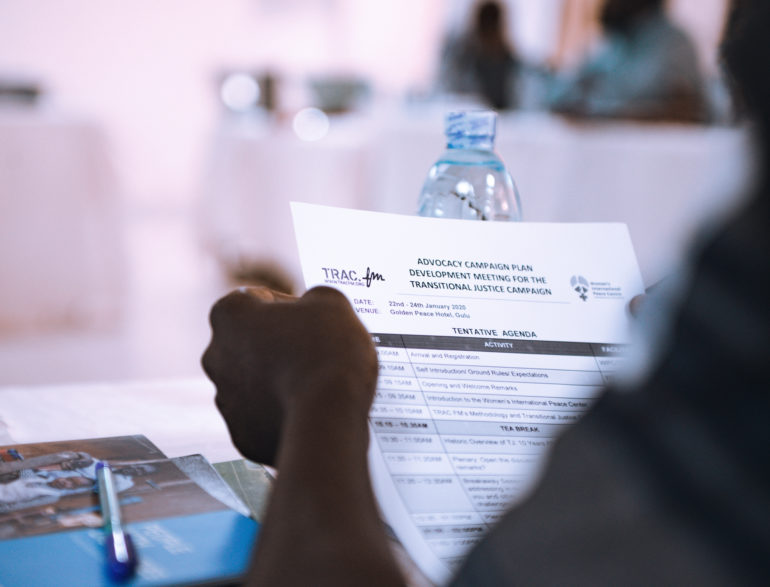To ensure a fruitful campaign, The Peace Centre and TRAC FM organized a 3-day advocacy campaign planning meeting from 22nd to 24th January in Gulu District. 21 partner organizations represented Acholi, Lango, Teso, West Nile, and a national focus. These included ICTJ, AYINET, Refugee Law Project, Concerned Parents Association (CPA), Lira Women’s Peace Initiatives (WOPI-U), NECPA, Teso Women’s Peace Activists (TEWPA), Uganda Victims Foundations (UVF), Foundation for Justice and Development Initiatives (FJDI), LDML, Ombaci Massacre Victims Association, People’s Voice for Peace (PVP).
During the meeting, we identified and agreed on the focus areas for the campaign including goals and objectives, identified existing and new advocacy issues and opportunities related to transitional justice in northern Uganda mapped out stakeholders that are relevant to the conversation on transitional justice and strategize on a memorization act for northern Uganda.

He noted that the missed opportunity was the documentation of the atrocities that the Transitional Justice policy is trying to address. The language used in the Transitional Justice policy also needs to be articulated as CSOs carry out advocacy campaigns in order not to victimize the survivors and victims.
Some of the issues raised after the presentation included; Popularisation of the policy among its beneficiaries and the citizens; there should be a strategy developed by all relevant stakeholders to popularise and publicize the policy. The policy does not address the issue of stateless children born during the wars and the issue of the atrocities has been narrowed down to northern issues yet victims think it should be handled as a national issue. The participants formed groups to discuss what issues (challenges/ problems) they are addressing in regard to Transitional Justice, solutions/ interventions that they and other stakeholders/ partners are using to address those challenges?

Sandra highlighted that the campaign will consist of community and radio dialogues and data will be collected during the dialogues to be used in advocacy to promote Transitional Justice at the regional and national levels. The community dialogues will be issue-specific conversations supported by data collected during the radio talk shows. The participants then had to identify the most ideal criteria/structure on where and how to engage citizens during the community dialogues.

Radio Advocacy Campaign Themes identified included; the Transitional Justice Policy, Access to Justice (Formal Justice system), Traditional Justice Mechanisms, Nation Building and Reconciliation, healing, Reparation, Amnesty and Memorialization.
What opportunities does radio present in the campaign?

Lacambel Ogena speaks about the role of radio during and after the LRA War. Ogena ran a radio program named ‘Come Back Home’ during the turbulent times in northern Uganda. He dedicated his message on peace and reconciliation.
During this session, participants discussed the role of the media in the campaign highlighting that the media should not cause friction within the public to enable the campaign to achieve its objectives but rather use radio as a mediator between the government and the victims of the atrocities. There have been different unfruitful interventions on Transitional Justice in the target communities of the campaign and victims are tired of dialogues. How is this campaign going to be different? What strategies have been laid to achieve results? Participants emphasized that the poll questions shouldn’t be pointing figures but facilitating more open dialogue and the campaign should educate victims that reparation does not necessarily mean compensation.





1 Comment